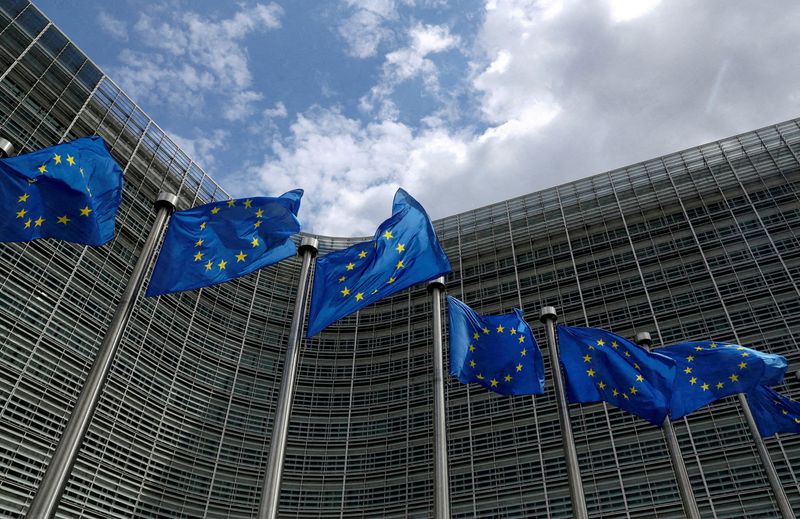By Prerana Bhat
BENGALURU (Reuters) - The European Central Bank will raise interest rates by 25 basis points on July 27, according to all economists in a Reuters poll, a slight majority of whom were now also expecting another hike in September.
Inflation in the euro zone has almost halved, down to 5.5% in June from a peak of 10.6% last October, but that has not been enough to deter the ECB, which said inflation was "projected to remain too high for too long" and it had "more ground to cover".
After eight consecutive rate rises since July 2022 for a total of 400 basis points, investors and analysts are now hotly debating how many more hikes are needed and how long rates will have to stay high to bring inflation to the 2% target.
ECB policymakers have all but promised one in July, leading all 75 respondents polled in the July 14-19 Reuters survey to conclude it will.
Economists were less unanimous about further tightening. While 35 of 75 predicted no more hikes, 40 economists now see another 25 basis point rise in September - a significant increase from only four in a June poll and similar to market expectations.
If realised, that would take the deposit rate to its highest since it was first launched as a policy tool in 1999.
"July is pretty much a given, they've communicated they will hike and it's not going to be a surprise to anyone. The question is whether they will have to hike in September or not," said Bas van Geffen, senior macro strategist at Rabobank.
"For the next meeting, communication is going to be the most difficult part...a hold or a hike, they will probably keep it open. It is going to be a close call either way."
Broadly hawkish commentary from the central bank has solidified views rate cuts would not be coming anytime soon. Over 90%, 55 of 61 economists saw no cuts until at least end-Q1.
The U.S. Federal Reserve was expected to deliver a final hike in the current cycle a day before the ECB's meeting. Slightly more than half the respondents in that survey expect one rate cut or more by end-March.
The expectation of narrowing interest rate differentials has partially boosted the euro around 5% against the dollar this year.
A stronger currency helps put downward pressure on prices through cheaper imports, but inflation was still not seen at target until at least 2025, in line with ECB's projections.
Core inflation, which strips out food and energy prices and gives a better picture of underlying demand, would be slightly lower than its current level of 6.8% by year-end, said 20 of 32 respondents to an extra question. Twelve said significantly lower.
Wage inflation will be the most sticky component of core inflation, according to all but two of 26 economists. Adding to the pressure, the unemployment rate was expected to barely increase to 6.8% from 6.5% now over the next two years.
Still, demand in the 20-member bloc has slowed, with the euro zone falling into a recession, primarily dragged by Germany, its biggest economy.
Particularly vulnerable to high energy prices, Germany fell into a recession in Q4 2022. While it was expected to come out of the downturn and grow 0.1% in Q2, it will still contract 0.3% on average in 2023.
The euro zone as a whole will grow 0.2% in Q2, Q3 and Q4 this year and average 1.0% in 2024, the survey showed.

"The latest data show euro zone growth is not picking up... While it is not all downhill from here, subdued growth is the best we can hope for," said Peter Vanden Houte, chief economist at ING.
(For other stories from the Reuters global economic poll:)